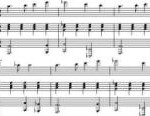The year 1396 (21 March 2017-20 March 2018) was the most sorrowful year for HarmonyTalk journal. One month after holding HarmonyTalk’s 13th establishment anniversary in Mohsen Ghanebasiri’s house in Tehran in April 2017, he untimely passed away. Mohsen Ghanebasiri was the prominent HarmonyTalk author.
Tag Archives: Mohsen Ghanebasiri
Latest posts
- Transition to Enlightenment: Six Lectures on Mozart’s String Quartets (5)
- Nasser Masoudi: The Voice of Gilan and a Legacy of Iranian Music
- Farhad Poupel: The Voice of the Shahnameh in the Orchestras Around the World
- Five Major Myths About Mozart’s Life
- Bahma Rajabi Passed Away!
- Reza Vohdani; Unveiling unpublished works, preservation of Iranian classical music
- Ahmad Pejman Passed Away!
- Timeless or Timely: The Role of Historical Context in Defining Artistic Value
- Leading the Charge in Censorship
- The Legacy of Khosrow Jafarzadeh
- Transition to Enlightenment: Six Lectures on Mozart’s String Quartets (4)
- Fereydoun Shahbazian, An Iranian Musical Icon Passed Away
From Past Days…

Is the Iranian National Anthem a Copy? (I)
The alleged similarity between the Iranian and South Korean National Anthems has been a matter of discussion among musicians in Iran for several years. Earlier in 2021, the issue was taken to the media again with not only claims that the anthem is very similar to another song but also the suggestion that its musical content should draw more on the Iranian national music. Some even went to the extent to suggest replacing it with the song “O, Iran” composed by the late Rouhollah Khaleghi. Before delving more into the main issue, it would not go amiss to consider some technical characteristics of the song “O, Iran” composed in 1944.

Avaye Naerika Percussion Orchestra
Avaye Naerika Percussion Orchestra is an Iranian percussion orchestra featuring 40 lady percussionists. The Orchestra was established as Iran’s largest all-female percussion orchestra in 2008 by Ms. Minoo Rezaei under the title Naerika Percussion Orchestra and changed its name to Avaye Naerika in 2017.

Gholam Reza Khan Minbashian: a pioneer in Iranian music (I)
Gholam Reza Khan Minbashian, a.k.a Salar-Mo’azez, was a pioneer in several domains in the history of the Iranian music. He is recognized as the first Iranian musician who was educated in classical music. He is also the first Iranian the score of whose works were published in Europe. He is the first Iranian to have launched courses on Western classical music and was also the first Iranian teacher of classical music. Moreover, he is the first founder of a string orchestra in Iran, the first author of the Iranian Radif which was available in oral form. Minbashian is also the first Iranian who studied music in Europe.

Polyphony in Iranian Music (I)
Despite the fact that Iranian folk music (regional music of Iran), like the Radif of Iranian traditional music, is monophonic and follows heterophony in principal, we experience polyphonic forms, albeit, majorly unconscious.

Transition to Enlightenment: Six Lectures on Mozart’s String Quartets (4)
The collaboration between Mozart and Haydn blossomed during the late 18th century in Vienna, a city that served as the epicenter of musical innovation. Amidst this vibrant cultural milieu, the two composers developed a profound friendship that extended beyond mere professional admiration. This connection is reflected in the six string quartets dedicated by Mozart to Haydn, aptly known as the “Haydn Quartets.”

Iannis Xenakis’ Persephassa
Shiraz Arts Festival which was held in Shiraz from 1967 to 1977 featured many contemporary renowned artists who were commissioned by the Iranian royalty to compose or create works of art for performance in the arts festival. Iannis Xenakis (1922-2001) participated in Shiraz Arts Festival three times in 1968, 1969 and 1971. The Greek-French composer,…
Read More

Prominent Iranian Musicologist Passes Away in Vienna
Khosrow Djafarzadeh, musicologist and architect, who was also one of the main authors of HarmonyTalk journal passed away on 15 July 2019.

Developments in Iranian Music Since Qajar Era (II)
Santour:
Nine-bridge and twelve-bridge Sanours were both used until the early Pahlavi dynasty. However, as Faramarz Payvar devised new methods for playing the nine-bridge Sanour, this variety of the instrument which was hammered by felted sticks became popular.

Harmony in the Iranian Music (I)
Translated by Mahboube Khalvati The article you are about to read was written by Rouhollah Khaleqi (1906-1965), composer, and conductor of Golha Orchestra (established in 1956). Khaleqi was one of the most prominent promoters of polyphony for the Iranian music and is one of the best representatives of the school of Ali Naghi Vaziri. In…
Read More

Iranian Fallacies: Iranian Chords
Finding a way to harmonize the Iranian music has been the subject of controversy among Iranian musicians for a long time. Some believe in the creation of harmonies for Iranian music based on a method which is similar to the tierce harmony; while others have either selected or invented some other methods. There are also some musicians who do not basically agree with the harmonization of the Iranian music.